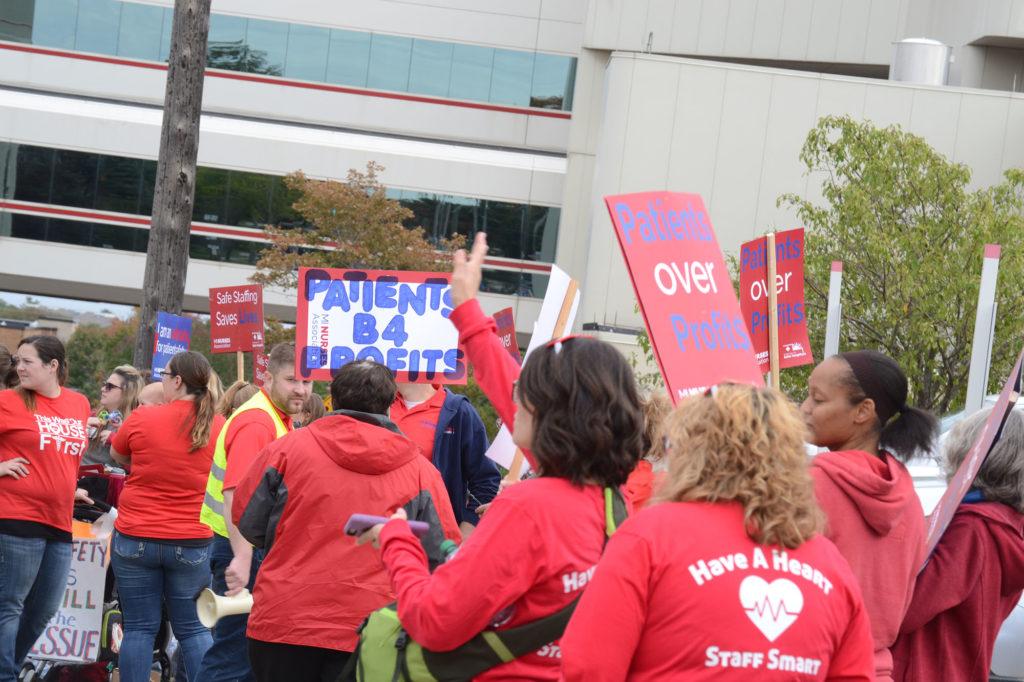Toting signs, sporting blue scrubs and red t-shirts and shouting for change, the nurses of UP Health Systems-Marquette formed a picket line from 7 a.m on Thursday, Oct. 5 to 7 a.m on Saturday, Oct. 7.
The nurses, who went on strike against the Marquette General Hospital for alleged understaffing and poor patient care, stood outside the hospital all day and all night in hopes to garner community support and be granted the change they want by the Upper Peninsula Health System (UPHS).
Roughly 400 nurses and community members showed up for the strike.
The nurses marched and carried signs with phrases such as “Patients Over Profit$,” “Have a Heart, Staff Smart” and “Don’t Dictate, Negotiate.”
“Signs are a next step, not a last step,” said Scott Balko, operating room registered nurse and president of the UPHS Marquette RN Staff Council and Marquette Nurses Association (MNA), in an MNA press release. “No one knows our patients or our community as well as Marquette nurses. From the beginning, RNs and community members have called on Duke LifePoint to invest in full-time permanent safe staffing levels.”
The nurses, who have been fighting for safe staffing since April, according to a press release from the MNA, chanted phrases such as “We’re nurses, we’re outside, there’s something wrong inside.”
Sara Linna, a registered nurse at MGH, said many of the nurses don’t enjoy their jobs anymore because of the poor staffing ratios. Since the day she began 10 months ago, she dealt with the problems of understaffing.
“Some days I cry going to work. I used to work afternoon shifts and I would get mandated for 16 [hour-long shifts] almost every day and I started to become the joke on the floor,” Linna said. “People would joke ‘oh, is Sara going to stay over again?’ I had to switch my entire life around just to stop getting mandated, and I stopped wanting to come to work. It wasn’t fun anymore.”
Linna said at the worst, she tends to eight patients at a time. There are no laws for staffing ratios, however guidelines suggest that the ratio of nurses to patients is 1 to 4.
Samuel Parsons, another registered nurse at MGH, explained the issues that come with the high patient to staff ratios.
“If we are 1 [nurse] to 8 [patients], we’re not able to get you out of pain quick enough if you’ve, for example, broken your leg. Even if you have to go to the bathroom or you have to use a bedpan, all of those things add up,” Parsons said. “It’s about the patients. It’s about the community. It’s about Yoopers taking care of Yoopers. This is a very caring profession.”
Kris Hough, another registered nurse at MGH said she has worked in Marquette’s health system for 29 years and was present for the last nurses strike in 1994, which dealt with the same issue of understaffing.
The administration was able to work together and improve things in 1994; this time, however, the problem has been more of a fight, Hough said.
“I don’t quite understand how they don’t see it’s a problem, but, I also don’t know where they’re coming from. I wish I did, so that way we could get somewhere.”
Hough cited numerous problems that nurses face with understaffing, one being after 16 to 18 hours of work, nurses simply don’t function as well.
On Saturday, MGH nurses claimed they were locked out of the hospital and could not return to work.
Victor Harrington, regional director of marketing and business development at UP Health Systems, said the nurses were not “locked out” but rather not scheduled to work because the temporary nurses covering shifts during the strike had two more days on their contract.
Over the next two days, people from the community continued to stand outside of the hospital with signs to support the nurses.
“Honestly, I really hope that the hospital sees that the community is standing with us and that not only do us as nurses want patient safety to be the number one priority, but that the community wants their healthcare taken seriously,” Parsons said.
On Monday morning, the nurses returned to their jobs, walking together into the hospital in solidarity.
“Our regular team of RNs have returned to work, and we are happy to have our team back. As you would imagine, we are eager to move beyond this work stoppage and renew our focus on the delivery of quality patient care to our community,” Harrington said.
Harrington said in a statement that UPHS looks forward to returning to bargain with the nurses to help meet the needs of the community.






























